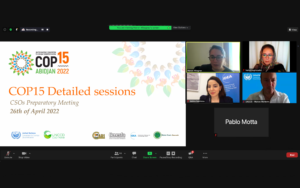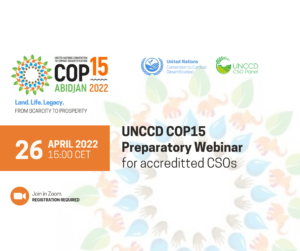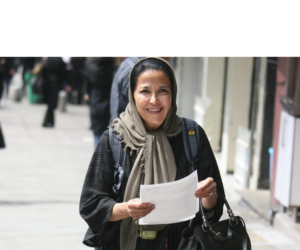Report from 15-16 March
The first two days of the CRIC19 addressed the following agenda items:
- Opening of the CRIC19
- Adoption of the CRIC19 agenda
- Review of the implementation of the Convention: update on the implementation of the voluntary land degradation neutrality targets.
The second day (March 16) ended with an introduction by the GM and MIROVA of the next item on the agenda, namely the operationalization of the land degradation neutrality fund. Discussions will continue on this topic during the session on March 17.
| >> The CRIC19 sessions can be viewed on the UN web-TV : https://webtv.un.org/search/1st-meeting-19th- session-of-committee-for-review-cric-19-un-convention-to-combat- desertification/6240696365001/?term=CRIC&sort=date |
| >> The Earth Negotiations Bulletin also provides a daily summary of the CRIC19: https://enb.iisd.org/events/19th-session-committee-review-implementation-convention-cric-19-unccd |
Opening of the CRIC-19
The Executive Secretary of the Convention, Mr. Ibrahim Thiaw, recalled that the pandemic has highlighted the importance of the work of the Convention, as human health is inseparable from the health of the land.
Several events on the international agenda in 2021 will provide opportunities to increase actions against desertification: the 15th Conference of the Parties of the UNCCD, the beginning of the UN Decade for Ecosystem Restoration.
This CRIC, whose format is readapted to the pandemic, will allow debates and exchanges of experiences between the parties. Some of the issues and themes addressed by the Convention are still the subject of heated debate between countries, and the CRIC is important to hear everyone’s points of view.
The opening of the CRIC was followed by statements made on behalf of the Africa, EU and Member States, Asia and the Pacific, Latin America and the Caribbean, Northern Mediterranean, Central and Eastern Europe, and Arab Group regions. From these statements, we can highlight:
- The still numerous challenges to achieve Land Degradation Neutrality, requiring more commitments:
- Funds are insufficient to implement neutrality, need to increase grants flows. There are many expectations from the LDN Fund.
- There are still needs to be addressed in terms of capacity for project elaboration, monitoring and evaluation, as well as in terms of technology.
- There is a need to put in place systems to monitor NDT indicators.
- There is a consensus on the legitimacy of the UNCCD to address drought issues, which requires urgent action and attention.
- The establishment of a legally binding instrument on drought, which is being debated between regions (African countries are calling for such an instrument, the European Union prefers strengthening existing frameworks to developing new ones).
- Land tenure is highlighted by the EU as a key factor for responsible land governance.
- The Latin America and Caribbean group mentions the need to ensure the participation of CSOs to implement transformation strategies.
The CSO statement at the opening of the CRIC included the following recommendations:
| 1. To reach land degradation neutrality and address desertification and drought, fix the gap between policies, commitments, and concrete actions on land and communities at the local level. 2. Engage with local communities and especially those of women, youth and pastoralists so as to ensure that their rights and interests are guaranteed in policy discussion relevant to the governance and use of land, water and other natural resources. 3. Support and facilitate participation of civil society throughout the decision-making processes regarding LDN target and National Drought Plans. 4. Recognize agroecology and community-led initiatives as a way to implement the UNCCD and to reach LDN, especially to avoid land degradation. 5. The integration of VGGT in the National Policies and subsequent projects and programs is necessary to guarantee land access to minority groups as women, pastoralists, youth and indigenous people. |
Review of the implementation of the Convention: update on the implementation of the voluntary LDN targets
The statements made on behalf of the regions and countries focused on the following items:
- The need to mobilize more funding. The Latin America and Caribbean region is asking in particular for a clear vision of the financing of the implementation of the Convention at the next COP.
- The need to consider the specificity of the countries.
- The need for capacity building to set up and implement transformative projects to achieve the LDN. The African region particularly insists on the need for technical and financial reinforcement.
- The establishment of monitoring and evaluation mechanisms. On this subject, there is a demand for more sharing of experiences between countries and harmonization of indicators.
- For the monitoring and evaluation of the achievement of the LDN, the question of the availability of high quality geospatial data is important.
- Several interventions mentioned the LDN Fund (which is not mentioned in the LDN implementation report): it is currently insufficient to finance global commitments on LDN.
- Central Asia is calling for the creation of a specific LDN Fund for the region.
- Testimonies on the actions implemented to achieve the LDN still focus on planting and reforestation actions. The Changwon initiative was cited as an example. Chile plans to reforest 1⁄4 of a million hectares.
- India believes it is on schedule to achieve the LDN by 2030, and in line with the commitments made at COP14, will launch a center of excellence to share its knowledge on SLM in the context of South-South cooperation.
The development partner institutions that spoke (OSS, FAO, World Bank, IUCN, GEF) specified their support for the implementation of the LDN:
- Funds available to support countries in the implementation of the Convention (GEF-7).
- Monitoring and evaluation tools and methods available from the OSS, and possible support from the OSS in setting up projects targeting the GCF and the Adaptation Fund.
The CSO statement on the implementation of the LDN included the following recommendations:
| 1. The need for a report that illustrates the global LDN targets, with quantified goals in terms of area and investment, both in terms of restoring land as of avoiding and reducing unavoidable land degradation. 2. Transparent information to be shared regarding the areas of intervention and concrete actions envisaged by these projects and programs. 3. Inclusion and effective participation of CSOs, as well as representatives of women, youth and indigenous peoples in the definition or updating of LDN targets, and in the development and implementation, monitoring and evaluation of transformative projects and programs. 4. Recalling COP14 decision 26 on land tenure, CSOs call on countries to include the VGGTs in the development and implementation of transformative projects and programs, and to ensure that they promote equal land rights and access to land for all, especially for vulnerable and marginalized groups. 5. Considering agroecological practices to avoid land degradation. |
Report from 17-19 March
The following CRIC days involved:
- The Land Degradation Neutrality Fund (LND Fund)
- The implementation of the drought initiative and the follow-up of policy frameworks on land tenure and gender
- The report of the intergovernmental group on drought
The day of March 19 ended with the adoption of the interim report of the CRIC and a closing ceremony marked by final statements from the Executive Secretary of the Convention, regional groups and civil society.
| >> The CRIC debates can be replayed on the UN web-TV: https://webtv.un.org/search/1st-meeting-19th- session-of-committee-for-review-cric-19-un-convention-to-combat- desertification/6240696365001/?term=CRIC&sort=date |
| >> The Earth Negotiations Bulletin also provides a daily summary of the exchanges: https://enb.iisd.org/events/19th-session-committee-review-implementation-convention-cric-19-unccd |
| >> The CRIC draft report, summaries of the exchanges and country statements are available on the UNCCD website: https://www.unccd.int/conventioncommittee-review-implementation-convention-cric/cric19-15-19-march-2021-online |
| The closing statement of the Executive Secretary of the Convention: https://www.unccd.int/news-events/unccd-cric19-closing-remarks-ibrahim-thiaw |
Review of the implementation of the Convention: Operationalization of the Land Degradation Neutrality Fund
The MIROVA company, manager of the LDN fund, introduced the session with some explanations on the current situation of the fund (see also the report, document ICCD/CRIC(19)/3).
Observations:
- There is a significant lack of funding for the SDGs
- and a need to mobilize multiple sources of financing, including private sector financing.
- The mobilization of the private sector requires the implementation of innovative and attractive facilities, which is what the LDN Fund proposes.
The LDN fund is managed by MIROVA, which was selected following a call for tenders and which has been working on the preparation of the fund’s terms and conditions, through consultations with multiple stakeholders including civil society and scientists.
An assistance mechanism has been set up to facilitate the preparation of projects. This facility is managed by the company IDH, also selected through a call for tenders.
The fund is intended to contribute to the commitments of LDN but also to other commitments of the UNFCCC and the CBD. The monitoring modalities of the fund are taken from the LDN conceptual framework.
- The LDN fund is currently made up of 70% private and 30% public funding.
- Canada has announced a contribution to the Fund that will bring the total mobilized envelope to USD 200 million.
- More than 200 projects have been submitted to the LDN Fund, 10 have been supported by the technical assistance facility, and 5 are in the process of being financed by the Fund.
- Desire for more geographic and thematic diversity in the projects supported.
A website has been set up to provide transparent information on the projects supported by the LDN Fund and the lessons learned: https://www.idhsustainabletrade.com/ldn-insights-report/
The country statements show the gap between the expectations for financing the implementation of the voluntary LDN targets and meeting global commitments, and the current status of the LDN Fund.
The Africa group:
- Emphasizes the central aspect of financing the implementation of the Convention and requests that the Convention be provided with its own financial instrument.
- Emphasizes that the amount mobilized by the fund is lower than the investment needs, and that the conditions of return on investment are complex.
The Africa group identifies several questions:
- Returns on investments should be considered from land that has already been reclaimed. How can the fund take this into account?
- What incentives should be provided to the private sector to mobilize for investment?
And makes recommendations:
- Conduct a comprehensive inventory of the financial needs to achieve LDN on a global scale and establish a roadmap for mobilizing this funding
- Establish a simplified guide for mobilizing the LDN fund - highlighting the role of national consultations for project development.
- Strengthen collaboration with the GEF.
- Sign an agreement with the GCF similar to the GEF agreement
- Encourage the formulation of regional LDN projects
- Organize a global conference for investment in LDN
The following statements made by the regional and country groups make the following recommendations and issues regarding the LDN Fund:
- Importance of respecting environmental and social standards, land tenure and stakeholder participation.
- Importance of measuring and assessing socio-economic, livelihood and biodiversity impacts.
- Provide capacity building and support for project development.
- Popularization of the LDN Fund’s funding criteria
- Increase geographic diversity of projects, balance the project portfolio between forestry and agricultural projects.
- Projects should focus on strengthening local and national value chains. International value chains are not sustainable and benefit women less.
- Provide transparent information on the LDN fund and the projects it finances.
- Show how the public and private sectors can work together.
- Integrate more of the UNCCD national focal points.
- Fund small projects and scientific projects of global impact through the LDN Fund.
- How does the fund ensure that it is not just a greenwashing mechanism?
MIROVA provides the following response:
- It is important to support collaboration between the public sector, private sector and CSOs.
- Ongoing improvement of communication and information sharing (new website: https://www.idhsustainabletrade.com/ldn-insights-report/)
- The LDN Fund team is working on finding projects in different regions.
- Desire to communicate more with stakeholders.
- Looking for synergies with other financial facilities for project preparation.
- We know that degradation is mainly linked to agriculture and forestry linked to the international supply chain.
- Greenwashing is not a desired option: we need strong social and environmental safeguards.
- Strict enforcement of these safeguards by the project manager.
- The LDN Fund is open to projects that include agroecology.
- The LDN Fund does not finance large plantations but projects that include mosaics of plantations and crops.
The CSO statement on the operationalization of the LDN Fund included the following recommendations:
| 1. CSOs call for more information on the projects financed by the LDN fund, as well as on the lessons learned by the LDN fund on the opportunities and favorable conditions for a private sector contribution to sustainable development. 2. CSOs invite countries to further consider the opportunity that the fund can present to support initiatives built on bottom-up approaches, and contributing to the achievement of the National LDN targets. |
Review of the implementation of the Convention: drought initiative and follow-up on gender and land policy frameworks (decision 26/COP14)
Parties’ statements on drought
There is a divergence of views regarding the establishment and adoption of a legally binding protocol on drought at the global level.
- One part of the countries wants such a protocol to draw attention to drought disasters and to provide appropriate responses.
- The other part of the countries is in favor of strengthening the existing mechanisms and synergies between the three Rio Conventions.
Nevertheless, the Parties recognize the relevance of the UNCCD to address the issue of drought and recommend:
- The definition of national action plans and the establishment of early warning systems.
- Capacity building at all levels.
- Identification of funding for areas suffering or at risk of suffering from drought.
Gender-related statements by the parties
- Recognize the role of women in sustainable land management
- The declaration from the African region sets out the following actions to be taken: improving access to land for women, strengthening and raising awareness of women for their empowerment.
- Recommendation of more concrete actions to integrate gender in the implementation of the Convention.
- Gender mainstreaming must be an ongoing effort.
- The pandemic has affected women more.
- The initiative of a Gender Caucus during COP14 is welcomed and should be reiterated.
Statements by the parties concerning land tenure
- The parties reiterate the interest or the call to implement the FAO Voluntary Guidelines for Good Governance in Land Tenure (VGGT).
- However, several voices were raised concerning the taking into account of the specificities of the countries (taking into account mentioned in decision 26/COP14).
- The countries welcome the technical guide currently being finalized, which will provide recommendations for including the VGGTs in the implementation of the convention.
- The guide is seen by some as a potentially binding tool, and there is a request for flexibility in the guidelines.
On a more cross-cutting level, Burkina Faso emphasizes the importance of rangelands and would like to see a special recommendation adopted on rangeland restoration.
The CSO statement on drought, gender and land tenure includes the following recommendations:
| - It is necessary to develop initiatives with a holistic approach and join efforts from different countries to improve drought management based on early warning systems. Effective communication between government, funders, and civil society, is key to enhancing the resilience of communities and ecosystems. - Regarding land tenure security, the integration of VGGT in National Policies is necessary to guarantee access and adequate management of land to minority groups, such as women, pastoralists, and indigenous people, and to build more resilient communities in the face of challenges such as climate change and droughts. In this sense, we encourage Parties to consider the technical guide to integrating the VGGT into LDN that is under preparation by the Secretariat and FAO. - We would like to call the parties to consider urgent measures to reduce and mitigate threats to land tenure security of the most vulnerable communities, which have increased significantly because of the COVID-19 pandemic. We think that the Science-Policy Interface could provide substantive evidence on how such integration of VGGT can improve the resilience of land users in the context of post-COVID recovery. |
Review of the report of the Intergovernmental Working Group on drought
This CRIC19 session is again an opportunity for some Parties to reiterate their call for a drought protocol, while others prefer strengthening existing frameworks.
The working group is committed to deepening its analysis on this topic.
Countries expect the working group to deepen its work and include:
- Making practical recommendations and providing guidance on the most effective ways to close management gaps.
- Sharing experiences across regions and strengthening existing partnerships.
- Identifying gaps and available tools for drought management.
- This work should result in better access to information and resources at all levels.
- Climate-sensitive agricultural approaches can be explored.
- Explore opportunities for mechanisms to encourage behavior change.
- What can the private sector do through innovative mechanisms to address drought?
The CSO statement on the report of IWG on drought included the following recommendations:
| - CSOs would like to see this working group increase the intensity of its work to generate strong and appropriate decisions by the next COP that will contribute to reducing the vulnerability of ecosystems and communities to drought through enhanced land and water resource management. - CSOs see this as an opportunity to prioritize water on public policy agendas and ensure that water resources are recognized as an important social and economic public good.CSOs therefore urge the Working Group to consider the local knowledge, practices, and know-how of local communities, especially the knowledge of women, pastoralists and oasis dwellers about water conservation and sustainable use. CSOs call on the Intergovernmental Working Group to include its stakeholders in the consultations it plans to undertake in the coming months. - CSOs accredited to the Convention urge the working group to consider the need to improve knowledge of water resources and the articulation between the multiple uses in order to establish good governance and shared management of the resource in its work and future recommendations. - We urge the IWG to consider how conflict-sensitive programming that is locally appropriate and addresses how climate change and other environmental drivers of conflict can be mitigated so as to deliver the necessary benefits to people in fragile and conflict-affected states. |





